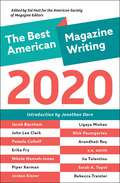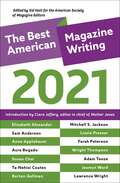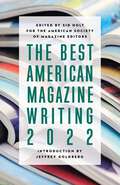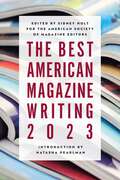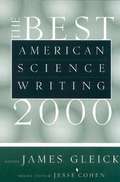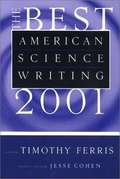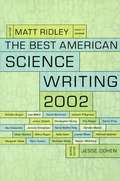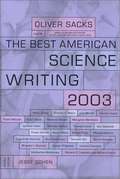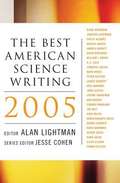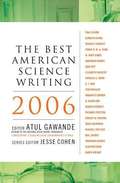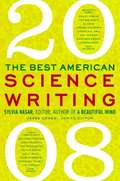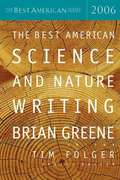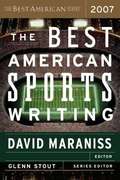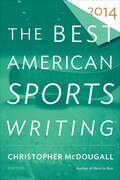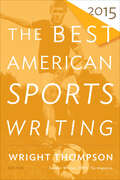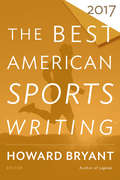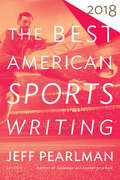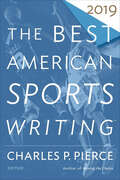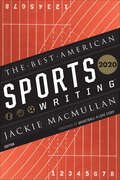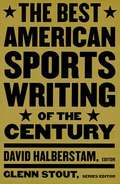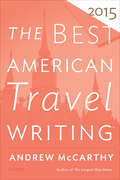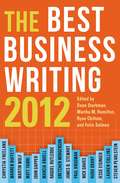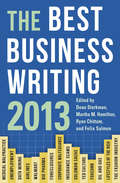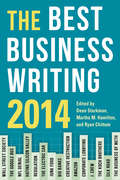- Table View
- List View
The Best American Magazine Writing 2020
by American Society of Magazine EditorsThe Best American Magazine Writing 2020 brings together outstanding writing, from in-depth reporting to incisive criticism. The anthology features excerpts from major projects that challenge American certitudes: the Washington Post Magazine’s “Prison” issue, detailing the scope of mass incarceration, and the New York Times Magazine’s “The 1619 Project,” which recenters the nation’s history around slavery and its legacies. It includes extraordinary globe-spanning journalism, including pieces on the genocide against the Rohingya (New York Times Magazine) and the unintended consequences of a dengue fever vaccine (Fortune). Pamela Colloff details prosecutors’ reliance on an untrustworthy jailhouse informant (New York Times Magazine in partnership with ProPublica), and a ProPublica series investigates the disaster that befell the USS Fitzgerald.The anthology showcases the work of remarkable stylists, including Jia Tolentino’s cultural commentary (New Yorker) and Ligaya Mishan’s columns on food and culture (T: The New York Times Style Magazine). Columns by s.e. smith consider disability (Catapult), and the DeafBlind poet John Lee Clark writes about art he can touch (Poetry). Jordan Kisner visits a Martha Washington–themed debutante ball in Texas near the Mexican border for The Believer, and Jacob Baynham offers a moving portrait of his father-in-law (Georgia Review). Arundhati Roy excoriates the increasing authoritarianism of Modi’s India (The Nation in partnership with Type Media Center). The anthology concludes with Jonathan Escoffery’s short story of homesickness for Jamaica, “Under the Ackee Tree” (Paris Review).
The Best American Magazine Writing 2021
by Sid HoltThe Best American Magazine Writing 2021 presents outstanding journalism and commentary that reckon with urgent topics, including COVID-19 and entrenched racial inequality. In “The Plague Year,” Lawrence Wright details how responses to the pandemic went astray (New Yorker). Lizzie Presser reports on “The Black American Amputation Epidemic” (ProPublica). In powerful essays, the novelist Jesmyn Ward processes her grief over her husband’s death against the backdrop of the pandemic and antiracist uprisings (Vanity Fair), and the poet Elizabeth Alexander considers “The Trayvon Generation” (New Yorker). Aymann Ismail delves into how “The Store That Called the Cops on George Floyd” dealt with the repercussions of the fatal call (Slate). Mitchell S. Jackson scrutinizes the murder of Ahmaud Arbery and how running fails Black America (Runner’s World).The anthology features remarkable reporting, such as explorations of the cases of children who disappeared into the depths of the U.S. immigration system for years (Reveal) and Oakland’s efforts to rethink its approach to gun violence (Mother Jones). It includes selections from a Public Books special issue that investigate what 2020’s overlapping crises reveal about the future of cities. Excerpts from Marie Claire’s guide to online privacy examine topics from algorithmic bias to cyberstalking to employees’ rights. Aisha Sabatini Sloan’s perceptive Paris Review columns explore her family history in Detroit and the toll of a brutal past and present. Sam Anderson reflects on a unique pop figure in “The Weirdly Enduring Appeal of Weird Al Yankovic” (New York Times Magazine). The collection concludes with Susan Choi’s striking short story “The Whale Mother” (Harper’s Magazine).
The Best American Magazine Writing 2022
by Sid HoltThe Best American Magazine Writing 2022 presents a range of outstanding writing on timely topics, from in-depth reporting to incisive criticism: Kristin Canning calls for a change in how we talk about abortion (Women’s Health), and Ed Yong warns us about the next pandemic (The Atlantic). Matthieu Aikins provides a gripping eyewitness account of the Taliban’s seizure of Kabul (New York Times Magazine). Heidi Blake and Katie J. M. Baker’s “Beyond Britney” examines how people placed under legal guardianship are deprived of their autonomy (BuzzFeed News). Rachel Aviv profiles a psychologist who studies the fallibility of memory—and has testified for defendants including Harvey Weinstein and Bill Cosby (The New Yorker).The anthology includes dispatches from the frontiers of science, exploring why Venus turned out so hellishly unlike Earth (Popular Science) and detailing the potential of NASA’s James Webb Space Telescope (Quanta). It features celebrated writers, including Harper’s magazine pieces by Ann Patchett, whose “These Precious Days” is a powerful story of friendship during the pandemic, and Vivian Gornick, who offers “notes on humiliation.” Carina del Valle Schorske depicts the power of public dance after pandemic isolation (New York Times Magazine). And the NBA icon Kareem Abdul-Jabbar lauds the Black athletes who fought for social justice (AARP the Magazine). Amid the continuing reckoning with racism, authors reconsider tarnished figures. The Black ornithologist and birder J. Drew Lanham assesses the legacy of John James Audubon in the magazine that bears his name, and Jeremy Atherton Lin questions his youthful enthusiasm for Morrissey (Yale Review). Jennifer Senior writes about memory and the lingering grief felt for a friend killed on 9/11 (The Atlantic). The collection concludes with Nishanth Injam’s story of queer first love across religious boundaries, “Come with Me” (Georgia Review).
The Best American Magazine Writing 2023
by Sidney HoltThe Best American Magazine Writing 2023 offers a selection of outstanding journalism on timely topics, including inequalities and injustices pressuring families, especially mothers. Rozina Ali tells the story of a U.S. marine who unlawfully adopted an Afghan girl and her family’s efforts to bring her home (New York Times Magazine). A Mother Jones exposé confronts the imprisonment of women for failing to protect their children from their abusive partners. “The Landlord and the Tenant” juxtaposes the lives of a poor single mother convicted for her children’s deaths in a fire and the man who owned the fatal property (ProPublica with Milwaukee Journal Sentinel). Caitlin Dickerson investigates the history of the U.S. government’s family-separation policy (The Atlantic). Jia Tolentino’s New Yorker commentary considers abortion in a post-Roe world.The anthology features pieces on a wide range of subjects, such as Nate Jones on the “Nepo Baby” and Allison P. Davis’s essay about a decade on Tinder (New York). Natalie So recounts how her mother’s small computer chip company became the target of a Silicon Valley crime ring (The Believer). Clint Smith asks what Holocaust memorials in Germany can teach the United States about our reckoning with slavery (The Atlantic). Esquire’s Chris Heath examines the FBI’s involvement in a plot to kidnap the governor of Michigan. Courtney Desiree Morris takes a queer psychedelic ramble through New Orleans (Stranger’s Guide). Namwali Serpell reflects on representations of sex workers (New York Review of Books). An ESPN Digital investigation uncovers Penn State’s other serial sexual predator before Jerry Sandusky. Profiles of the acclaimed actress Viola Davis (New York Times Magazine) and the self-taught artist Matthew Wong (New Yorker), as well as Michelle de Kretser’s short story “Winter Term” (Paris Review), round out the volume.
The Best American Science Writing 2000
by James GleickThis offers glimpses of new realms of discovery and thought, exploring scientific territory that is unfamiliar to most of us, and an introduction to a collection of science writers and thinkers.
The Best American Science Writing 2001
by Timothy FerrisThis anthology presents 22 essays and a poem (by John Updike) published during 2001 in various publications, and an introduction by guest editor/science writer Ferris. Among the contributors: Freeman Dyson, Stephen Jay Gould, Tracy Kidder; topics run the gamut.
The Best American Science Writing 2002
by Alan Lightman Matt RidleyIf, as Matt Ridley suggests, science is simply the search for new forms of ignorance, then perhaps it follows that with science's advances come new questions. Will human genetic engineering become commonplace? Will human cloning ever be safe? Are there many universes? How much will the climate change during the coming century? The Best American Science Writing 2002 gathers top writers and scientists covering the latest developments in the fastest-changing, farthest-reaching scientific fields, such as medicine, genetics, computer technology, evolutionary psychology, cutting-edge physics, and the environment. Among this year's selections: In "The Made-to-Order Savior," Lisa Belkin spotlights two desperate families seeking an unprecedented cure by a medically and ethically unprecedented means -- creating a genetically matched child. Margaret Talbot's "A Desire to Duplicate" reveals that the first human clone may very likely come from an entirely unexpected source, and sooner than we think. Michael Specter reports on the shock waves rippling through the field of neuroscience following the revolutionary discovery that adult brain cells might in fact regenerate ("Rethinking the Brain"). Christopher Dickey's "I Love My Glow Bunny" recounts with sly humor a peculiar episode in which genetic engineering and artistic culture collide. Natalie Angier draws an insightful contrast between suicide terrorists and rescue workers who risk their lives, and finds that sympathy and altruism have a definite place in the evolution of human nature, David Berlinski's "What Brings a World into Being?" ponders the idea of biology and physics as essentially digital technologies, exploring the mysteries encoded in the universe's smallest units, be they cells or quanta. Nicholas Wade shows how one of the most controversial books of the year, The Skeptical Environmentalist, by former Greenpeace member and self-described leftist Bjorn Lomborg, debunks some of the most cherished tenets of the environmental movement, suggesting that things are perhaps not as bad as we've been led to believe. And as a counterpoint, Darcy Frey's profile of George Divoky reveals a dedicated researcher whose love of birds and mystery leads to some sobering discoveries about global warming and forcefully reminds us of the unsung heroes of science: those who put in long hours, fill in small details, and take great trouble. In the end, the unanswered questions are what sustain scientific inquiry, open new frontiers of knowledge, and lead to new technologies and medical treatments. The Best American Science Writing 2002 is a series of exciting reports from science's front lines, where what we don't know is every bit as important as what we know.
The Best American Science Writing 2003
by Oliver SacksIn his introduction to The Best American Science Writing 2003, Dr. Oliver Sacks, whom the New York Times has called "the poet laureate of medicine," writes that "the best science writing ... cannot be completely 'objective' -- how can it be when science itself is so human an activity? -- but it is never self-indulgently subjective either. It is, at best, a wonderful fusion, as factual as a news report, as imaginative as a novel." It is with this definition of "good" science writing in mind that Dr. Sacks has selected the twenty-five extraordinary pieces that make up the latest installment of this acclaimed annual. This year, Peter Canby travels into the heart of remote Africa to track a remarkable population of elephants; Atul Gawande shows us the way doctors learn their skills by performing supposedly routine procedures on unsuspecting patients. With candor and tenderness, Floyd Skloot observes the toll Alzheimer's disease is taking on his ninety-one-year-old mother, and is fascinated by the memories she retains. Marcelo Gleiser asks: If we are the universe's sole intelligent species, then what must we do to be good citizens of the cosmos? Natalie Angier writes about the challenge of traveling to distant stars. Gunjan Sinha explores the mating behavior of the common prairie vole and what it reveals about the human pattern of monogamy. Michael Klesius attempts to solve what Darwin called "an abominable mystery": How did flowers originate? Lawrence Osborne tours a farm where a genetically modified goat produces the silk of spiders in its milk. Joseph D'Agnese visits a home for retired medical research chimps. And in the collection's final piece, Richard C. Lewontin and Richard Levins reflect on how the work of Stephen Jay Gould demonstrated the value of taking a radical approach to science. As this series firmly attests, science writing has achieved a central place in our culture, and one can posit that the reason why has to do with the special thrill of discovery that a cogent piece of science writing can elicit. As Dr. Sacks writes of Stephen Jay Gould -- to whose memory this year's anthology is dedicated -- an article of his "was never predictable, never dry, could not be imitated or mistaken for anybody else's." The same can be said of all of the writing contained in contributions to this diverse collection "that can be enjoyed by laymen, scientists, and writers alike" (Nature).
The Best American Science Writing 2005
by Alan LightmanToday's most prominent thinkers provide enlightening insight into some of the most important and cutting-edge topics in the field in this acclaimed series.
The Best American Science Writing 2006
by Atul GawandeTogether these twenty-one articles on a wide range of today's most leading topics in science, from Dennis Overbye, Jonathan Weiner, and Richard Preston, among others, represent the full spectrum of scientific inquiry, proving once again that good science writing is evidently plentiful.
The Best American Science Writing 2008
by Sylvia NasarEdited by Sylvia Nasar, bestselling author of A Beautiful Mind and former economics correspondent for the New York Times, The Best American Science Writing 2008 brings together the premiere science writing of the year. Distinguished by the foremost voices and publications--among them Pulitzer Prize-winner Amy Harmon, Nobel Prize-winner Al Gore, and award-winning and bestselling author Oliver Sacks--this anthology is a comprehensive overview of our most advanced and most relevant scientific inquiries.
The Best American Science and Nature Writing 2000
by David QuammenWith the inaugural volume of THE BEST AMERICAN SCIENCE AND NATURE WRITING, Houghton Mifflin showcases the finest writing of the past year on subjects of ever-increasing interest to readers. Guest editor David Quammen and series editor Burkhard Bilger have assembled a remarkable group of essays that originally appeared in periodicals from National Geographic, Science, and The New Yorker to Puerto del Sol and DoubleTake. Among the acclaimed writers represented are Natalie Angier on "Men, Women, Sex, and Darwin," Peter Matthiessen exploring "The Island at the End of the Earth," Richard Preston considering "The Demon in the Freezer," and Oliver Sacks remembering the "Brilliant Light" of his boyhood. Also including work by such literary lights as Anne Fadiman, Edward Hoagland, and Cullen Murphy, this volume presents selections bound together by their timelessness.
The Best American Science and Nature Writing 2006
by Brian GreeneBestselling author Brian Greene edits this year's volume of the finest science and nature writing. Contributors include Walter Kirn, Ron Rosenbaum, Jeffrey Toobin, and Oliver Sacks as well as many others.
The Best American Sports Writing 2007
by David MaranissFor fans of sports and just plain great writing, this absorbing collection, featuring twenty-eight of the finest pieces from the past year, has something for everyone. Guest editor David Maraniss, a Pulitzer Prize-winning journalist and author, has assembled a fresh crop of the people and stories that dominated the sports world in 2006. Michael Lewis gives a behind-the-scenes look at the legendary football coach Bill Parcells. Bob Hohler delves in the murky waters of modern amateur basketball, where teams blatantly dole out cash to players and shoe companies set their sights on prospects as young as twelve. William Rhoden traces the fate of an unknown filly injured on the racetrack. Jeff MacGregor describes the unforgettable Friars Club roast of boxing's provocative promoter Don King. Daniel Coyle follows a forty-year-old Slovene soldier who might be the world's best ultra-endurance athlete. L. Jon Wertheim tells of a young pro-basketball player who found himself wrestling the shoe bomber Richard Reid to the ground during a transatlantic flight. And Derek Zumsteg provides a hilarious and utterly original in-depth account of the baseball career of Bugs Bunny, "the greatest banned player ever." These pieces and many more go beyond the spotlight, revealing the people and issues that make sports so relevant and important to all of us.
The Best American Sports Writing 2014 (Best American Ser.)
by Christopher McDougall“Excellent . . . A no-brainer pickup for the sports collection.” — Booklist“An affirmation of the strong state of American sportswriting.” — Kirkus ReviewsFrom more than 350 national, regional, and specialty publications and, increasingly, the top sports blogs, Christopher McDougall, best-selling author of Born to Run: A Hidden Tribe, Superathletes, and the Greatest Race the World Has Never Seen, hand-selected the very best sports journalism of the past year.
The Best American Sports Writing 2015 (The Best American Series)
by Wright ThompsonFor twenty-five years, The Best American Sports Writing has built a solid reputation by showcasing the greatest sports journalism of the past year, culled from hundreds of national, regional, and specialty print and digital publications. Wright Thompson, many times included in this volume over the years, takes his turn at the helm by curating this exceptional collection. The only shared trait among these diverse pieces is the extraordinarily high caliber of writing, but collectively they tap into the pure passion that can only come from sports. And for all aspiring sports writers, says Thompson, &“these selections are both road map and compass.&” The Best American Sports Writing 2015 includesDon Van Natta Jr., Chris Ballard, Katie Baker, Christopher Beam, Wells Tower, Seth Wickersham, Ariel Levyand others WRIGHT THOMPSON, guest editor, started his sports writing career as a student at the University of Missouri, where he covered sports for the Columbia Missourian. He interned at the Times-Picayune in New Orleans and worked as the LSU beat writer. He then moved to the Kansas City Star, where he covered a wide variety of sports. In 2006 he joined ESPN.com and ESPN: The Magazine as a senior writer. He lives in Oxford, Mississippi. GLENN STOUT, series editor for The Best American Sports Writing since its inception, is the author of Young Woman and the Sea and Fenway 1912. He serves as the long-form editor for SB Nation and lives in Alburgh, Vermont.
The Best American Sports Writing 2017
by Glenn Stout Howard Bryant“Excellent . . . A no-brainer pickup for the sports collection.” —Booklist For over twenty-five years, The Best American Sports Writing has built a solid reputation by showcasing the greatest sports journalism of the previous year, culled from hundreds of national, regional, and specialty print and digital publications. Each year, the series editor and guest editor curate a truly exceptional collection. The only shared traits among all these diverse styles, voices, and stories are the extraordinarily high caliber of writing and the pure passion they tap into that can only come from sports.
The Best American Sports Writing 2018 (The Best American Series ®)
by Jeff Pearlman Glenn StoutFor more than twenty-five years, The Best American Sports Writing has built a solid reputation by showcasing the greatest sports journalism of the previous year, culled from hundreds of national, regional, and specialty print and digital publications. Each year, the series editor and guest editor curate a truly exceptional collection. The only shared traits among all these diverse styles, voices, and stories are the extraordinarily high caliber of writing, and the pure passion they tap into that can only come from sports.
The Best American Sports Writing 2019 (The Best American Series)
by Charles P. PierceThe latest addition to the acclaimed series showcasing the best sports writing from the past year For over twenty-five years, The Best American Sports Writing has built a solid reputation by showcasing the greatest sports journalism of the previous year, culled from hundreds of national, regional, and specialty print and digital publications. Each year, the series editor and guest editor curates a truly exceptional collection. The only shared traits among all these diverse styles, voices, and stories are the extraordinarily high caliber of writing, and the pure passion they tap into that can only come from sports.
The Best American Sports Writing 2020 (The Best American Series)
by Jackie MacMullan, Glenn StoutThe latest addition to the acclaimed series showcasing the best sports writing from the past year.For over twenty-five years, The Best American Sports Writing has built a solid reputation by showcasing the greatest sports journalism of the previous year, culled from hundreds of national, regional, and specialty print and digital publications. Each year, the series editor and guest editor curate a truly exceptional collection. The only shared traits among all these diverse styles, voices, and stories are the extraordinarily high caliber of writing, and the pure passion they tap into that can only come from sports.
The Best American Sports Writing of the Century
by David Halberstam Glenn StoutThis collection captures not only the century's greatest moments in baseball, boxing, horse-racing, golf, and tennis, but also showcases the best sports journalists of the twentieth century.
The Best American Travel Writing 2015 (Best American Ser.)
by Andrew McCarthyIn his introduction, guest editor Andrew McCarthy says that the best travel writing is &“the anonymous and solitary traveler capturing a moment in time and place, giving meaning to his or her travels.&” The stories in The Best American Travel Writing 2015 demonstrate just that spirit, whether it is the story of a marine returning to Iraq a decade after his deployment, a writer retracing the footsteps of humanity as it spread from Africa throughout the world, or looking for love on a physics-themed cruise down the Rhone River. No matter what the subject, the writers featured in this volume boldly call out, &“Yes, this matters. Follow me!&” The Best American Travel Writing 2015 includes Iris Smyles, Paul Theroux, Christopher Solomon Patricia Marx, Kevin Baker, Benjamin Busch, Maud Newton Gary Shteyngart, Paul Salopek, and others ANDREW MCCARTHY, guest editor, is the author of the New York Times best-selling travel memoir The Longest Way Home. He has served as an editor at large at National Geographic Traveler and been named travel journalist of the year by the Society of American Travel Writers. He is also an actor and director. JASON WILSON, series editor, is the author of Boozehound: On the Trail of the Rare, the Obscure, and the Overrated in Spirits and the digital wine series Planet of the Grapes. He has written for the Washington Post, the Boston Globe, the Philadelphia Daily News, and many other publications. He is the founding editor of The Smart Set and Table Matters.
The Best Business Writing 2012 (Columbia Journalism Review Books)
by Ryan Chittum Felix Salmon Dean Starkman Martha HamiltonAn anthology Malcolm Gladwell has called "riveting and indispensable," The Best Business Writing is a far-ranging survey of business's dynamic relationship with politics, culture, and life. This year's selections include John Markoff (New York Times) on innovations in robot technology and the decline of the factory worker; Evgeny Morozov (New Republic) on the questionable value of the popular TED conference series and the idea industry behind it; Paul Kiel (ProPublica) on the ripple effects of the ongoing foreclosure crisis; and the infamous op-ed by Greg Smith, published in the New York Times, announcing his break with Goldman Sachs over its trading practices and corrupt corporate ethos.Jessica Pressler (New York) delves into the personal and professional rivalry between former spouses and fashion competitors Tory and Christopher Burch. Peter Whoriskey (Washington Post) exposes the human cost of promoting pharmaceuticals for off-label uses. Charles Duhigg and David Barboza (New York Times) investigate Apple's unethical labor practices in China. Max Abelson (Bloomberg) reports on Wall Street's amusing reaction to the diminishing annual bonus. Mina Kimes (Fortune) recounts the grisly story of a company's illegal testing—and misuse—of a medical device for profit, and Jeff Tietz (Rolling Stone) composes one of the most poignant and comprehensive portraits of the financial crisis's dissolution of the American middle class.
The Best Business Writing 2013 (Columbia Journalism Review Books)
by Ryan Chittum Felix Salmon Dean Starkman Martha HamiltonAn anthology Malcolm Gladwell has called "riveting and indispensable," The Best Business Writing is a far-ranging survey of business's dynamic relationship with politics, culture, and life. This year's selections include John Markoff (New York Times) on innovations in robot technology and the decline of the factory worker; Evgeny Morozov (New Republic) on the questionable value of the popular TED conference series and the idea industry behind it; Paul Kiel (ProPublica) on the ripple effects of the ongoing foreclosure crisis; and the infamous op-ed by Greg Smith, published in the New York Times, announcing his break with Goldman Sachs over its trading practices and corrupt corporate ethos.Jessica Pressler (New York) delves into the personal and professional rivalry between Tory and Christopher Burch, former spouses now competing to dominate the fashion world. Peter Whoriskey (Washington Post) exposes the human cost of promoting pharmaceuticals off-label. Charles Duhigg and David Barboza (New York Times) investigate Apple's unethical labor practices in China. Max Abelson (Bloomberg) reports on Wall Street's amusing reaction to the diminishing annual bonus. Mina Kimes (Fortune) recounts the grisly story of a company's illegal testing—and misuse—of a medical device for profit, and Jeff Tietz (Rolling Stone) composes one of the most poignant and comprehensive portraits of the financial crisis's dissolution of the American middle class.
The Best Business Writing 2014 (Columbia Journalism Review Books)
by Ryan Chittum Dean Starkman Martha HamiltonThis anthology of the year's best investigative business writing explores the secret dealings of an elite Wall Street society and uncovers the crimes and misadventures of the young founder of Silk Road, the wildly successful online illegal goods site known as the "eBay of vice." It reveals how the Fed dithered while the financial crisis unfolded and explains why the leaders of a two-trillion-dollar bond fund went to war with each other. Articles from the best newspapers and magazines in the country delve into how junk-food companies use science to get you to eat more and how Amazon dodges the tax man how J.Crew revitalized itself by transforming its creative process and Russell Brand went deep on media and marketing after his GQ Awards speech went haywire.Best Business Writing 2014 includes provocative essays on the NFL's cover-ups and corporate welfare, Silicon Valley's ultralibertarian culture, and the feminist critique of Sheryl Sandberg's career-advice book for women, Lean-In. Stories about toast, T-shirt making, and the slow death of the funeral business show the best writers can find worthy tales in even the most mundane subjects.
